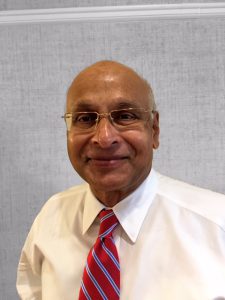
The British East India Company – How a Corporation Conquered and Colonized India
It is well known that India was once a colony of Britain. However, most people don’t know that India was colonized not by the British government but by a for-profit British corporation listed on the London Stock Exchange – The East India Company. This company became the most powerful corporation in history, controlling half the world’s trade and ruling an entire country. It had its own private army which, at its peak, numbered 200,000 soldiers, more than twice the size of the British army itself. Sunil will tell the amazing story of how this company, led by a band of opportunistic, greedy, and ruthless adventurers, managed to rule an entire subcontinent from a boardroom in the city of London.
Sunil was born in Lucknow, India in 1944. He graduated high school from La Martiniere College, Lucknow and received a bachelor’s degree in mechanical engineering from Indian Institute of Technology, Roorkee.
He worked at Union Carbide India before proceeding to University of California at Berkeley for graduate work. He received both a masters degree in engineering as well as an MBA from Berkeley. He worked as a Mechanical Engineer at American Can Company in San Francisco where his claim to fame is that he designed the machine that puts the can cover on the beer can making it safe for you beer drinkers to imbibe. For the majority of his career, Sunil was in finance: first, as an international banker with Bankers Trust Company serving in Mumbai, Singapore and New York and then, as an investment advisor with Fidelity Investments from which he retired in 2004.
Speaker Summary
Sunil told the fascinating story of the rise and fall of the East India Company based heavily on William Dalrymple’s book, “The Anarchy”. Sunil detailed how a publicly-traded British trading company with humble beginnings founded in 1599 with plans to primarily trade in spices in Indonesia and surrounding islands grew into the most powerful company in the world with control over the world’s richest country – India. He talked about how they were enabled by the British government through a royal charter awarding them a monopoly on all trade between England and Asia and furthered by the first example of corporate lobbying in Parliament to help maintain their power.
Sunil discussed the fall of the Mughal empire in India that facilitated the progressive growth of the EIC until they had established bases in Bombay, Calcutta and Madras and ultimately controlled the entire Indian sub-continent. He talked about how modern war techniques used by the EIC’s private army facilitated the spread of the EIC’s power against antiquated Mughal fighting approaches. He noted how Robert Clive became the richest man in Europe based on his exploits in India. Throughout, Sunil referenced the often inhumane and barbaric policies of Clive and the EIC as well as how they “smartly” built their wealth at essentially no risk by using the taxes they levied on the Indians to purchase the goods they then sold abroad to drive risk-free profits and wealth.
Sunil noted how the EIC had a role in the American Revolution since the tea at the Boston Tea Party came from the EIC and how the failures of the colonization efforts in America created fears about similar things happening in India (leading to putting Lord Cornwallis in place as the Governor in India). By 1803 the EIC had a 30-year charter to control India. This was dissolved in 1830 due to fears of how the EIC was impacting activities back in Great Britain. And the fall of the EIC eventually followed the growth of the impact of Evangelical Christians in India that led to the Indian Mutiny-Massacre in 1857. While the EIC put down the revolt, the bloody battle led the British Government to take over control of India from the EIC and India remained a British Colony until it was freed in 1947.
